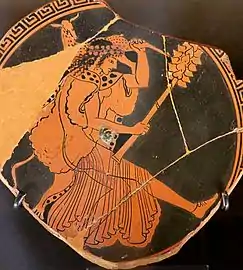| Argaeus I | |
|---|---|
| King of Macedonia | |
| Reign | c. 623-593 BC |
| Predecessor | Perdiccas I |
| Successor | Philip I |
| Spouse | unknown |
| Issue | Philip I |
| Dynasty | Argead |
| Father | Perdiccas I |
| Mother | unknown |
| Religion | Ancient Greek religion |
Argaeus (Greek: Ἀργαῖος, romanized: Argaios) was king[lower-alpha 1] of the ancient Greek kingdom of Macedonia. He was a member of the Argead dynasty and son of Perdiccas I. By allowing thirty years for the span of an average generation from the beginning of Archelaus' reign in 413 BC, British historian Nicholas Hammond estimated that Argaeus ruled around 623 BC.[3]
According to Herodotus and Thucydides, Argaeus was the second king of Macedonia.[4] However, a much later tradition records Caranus as the founder of Macedonia and therefore Argaeus as the fifth king. This unhistorical assertion is almost universally rejected by moderns scholarship as propaganda invented at the Argead court during the reign of Philip II.[5][6][7][8]
According to the 2nd-century AD Greek writer Polyaenus, Argaeus tricked the Illyrian king of the Taulantii, Galaurus, by dressing men as women with wreaths and thyrsi (staffs), closely related to the cult of Dionysus.[10][11][12] After the victory, Argaeus founded a temple dedicated to Pseudanor (Fake-man).[11]
References
Notes
- ↑ While Greeks such as Demosthenes and Aristotle referred to them as such, there is no evidence that any Macedonian ruler prior to Alexander III used an official royal title (basileus).[1][2]
Citations
- ↑ Errington, R.M. (1974). "Macedonian 'Royal Style' and Its Historical Significance". The Journal of Hellenic Studies. 94: 20. doi:10.2307/630417. JSTOR 630417. S2CID 162629292.
- ↑ King, Carol (2010). "Macedonian Kingship and Other Political Institutions". In Roisman, Joseph; Worthington, Ian (eds.). A Companion to Ancient Macedonia. Wiley-Blackwell. p. 375.
- ↑ N.G.L., Hammond; Griffith, G.T. (1979). A History of Macedonia Volume II: 550-336 B.C. Oxford: Clarendon Press. p. 4.
- ↑ "Herodotus, The Histories, Book 8, chapter 139, section 1". www.perseus.tufts.edu. Retrieved 2023-02-28.
- ↑ Eder, Walter; Renger, Johannes, eds. (2006). Chronologies of the Ancient World: Names, Dates, and Dynasties. Boston: Brill. pp. 188–190.
- ↑ Christesen, Paul; Murray, Sarah (2010). "Macedonian Religion". In Roisman, Joseph; Worthington, Ian (eds.). A Companion to Ancient Macedonia. Wiley-Blackwell. p. 432.
- ↑ Greenwalt, William (1985). "The Introduction of Caranus into the Argead King List". Greek, Roman, and Byzantine Studies. 26 (1): 43–49.
- ↑ Hammond 1979, p. 5.
- ↑ Thomas H. Carpenter; Christopher A. Faraone (1993). Masks of Dionysus. Cornell University Press. p. 262. ISBN 978-0-8014-2779-4.
- ↑ Joseph Roisman; Ian Worthington (7 July 2011). A Companion to Ancient Macedonia. John Wiley & Sons. pp. 432–. ISBN 978-1-4443-5163-7.
- 1 2 Mark William Padilla (1999). Rites of Passage in Ancient Greece: Literature, Religion, Society. Bucknell University Press. pp. 185–. ISBN 978-0-8387-5418-4.
- ↑ Polyaenus (1994). Stratagems of War: Books I-V. Ares. p. 315. ISBN 9780890055038.

